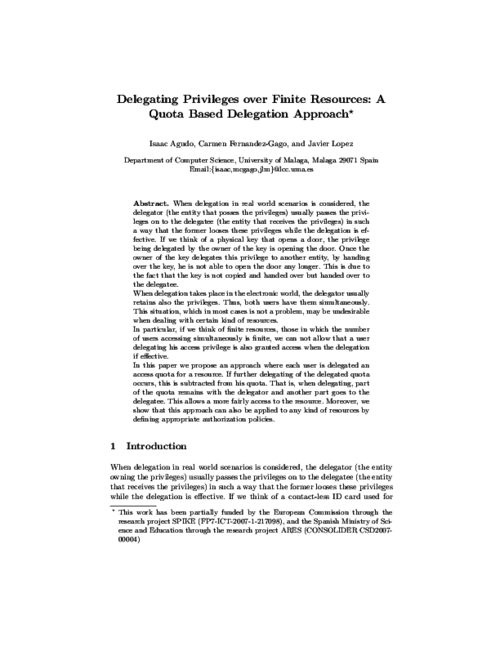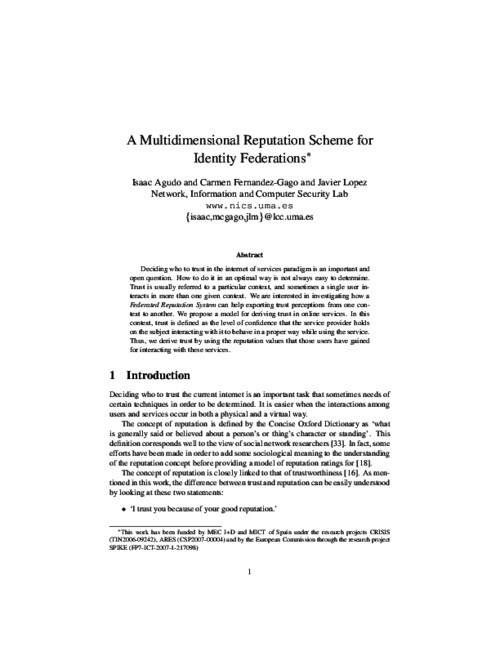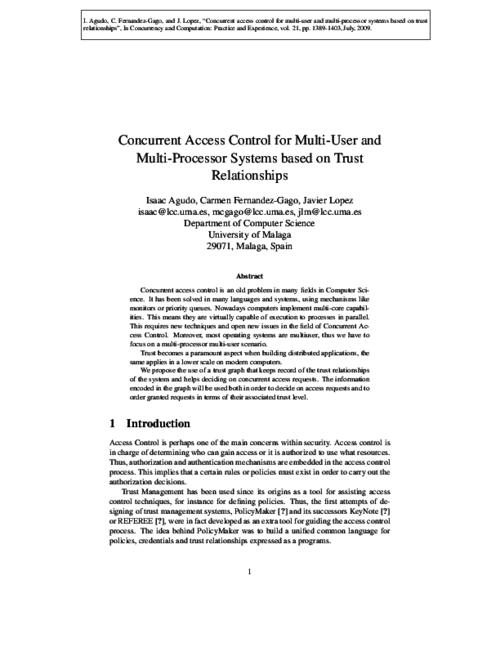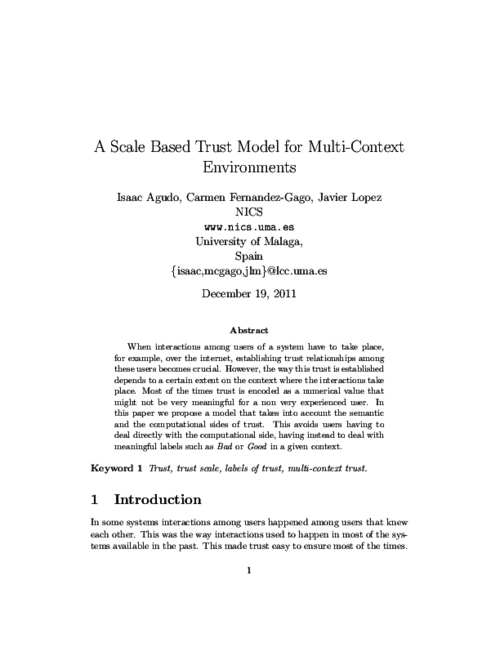 ] Year
] Year Accountability and Security in the Cloud, M. Felici, and C. Fernandez-Gago Eds., Lecture Notes in Computer Science 8937, Springer International Publishing, pp. 114-125, 2015. DOI
Abstract
In this paper we tackle the problem of privacy and confidentiality in Identity Management as a Service (IDaaS). The adoption of cloud computing technologies by organizations has fostered the externalization of the identity management processes, shaping the concept of Identity Management as a Service. However, as it has happened to other cloud-based services, the cloud poses serious risks to the users, since they lose the control over their data. As part of this work, we analyze these concerns and present a model for privacy-preserving IDaaS, called BlindIdM, which is designed to provide data privacy protection through the use of cryptographic safeguards.
Accountability and Security in the Cloud, M. Felici, and C. Fernandez-Gago Eds., Lecture Notes in Computer Science 8937, Springer International Publishing, pp. 114-125, 2015. DOI
Abstract
In this paper we tackle the problem of privacy and confidentiality in Identity Management as a Service (IDaaS). The adoption of cloud computing technologies by organizations has fostered the externalization of the identity management processes, shaping the concept of Identity Management as a Service. However, as it has happened to other cloud-based services, the cloud poses serious risks to the users, since they lose the control over their data. As part of this work, we analyze these concerns and present a model for privacy-preserving IDaaS, called BlindIdM, which is designed to provide data privacy protection through the use of cryptographic safeguards.
5th International Workshop on Formal Aspects in Security and Trust (FAST’08), LNCS 5491, Springer, pp. 302-315, 2008. DOI
Abstract
When delegation in real world scenarios is considered, the delegator (the entity that posses the privileges) usually passes the privileges on to the delegatee (the entity that receives the privileges) in such a way that the former looses these privileges while the delegation is effective. If we think of a physical key that opens a door, the privilege being delegated by the owner of the key is opening the door. Once the owner of the key delegates this privilege to another entity, by handing over the key, he is not able to open the door any longer. This is due to the fact that the key is not copied and handed over but handed over to the delegatee. When delegation takes place in the electronic world, the delegator usually retains also the privileges. Thus, both users have them simultaneously. This situation, which in most cases is not a problem, may be undesirable when dealing with certain kind of resources. In particular, if we think of finite resources, those in which the number of users accessing simultaneously is finite, we can not allow that a user delegating his access privilege is also granted access when the delegation if effective. In this paper we propose an approach where each user is delegated an access quota for a resource. If further delegating of the delegated quota occurs, this is subtracted from his quota. That is, when delegating, part of the quota remains with the delegator and another part goes to the delegatee. This allows a more fairly access to the resource. Moreover, we show that this approach can also be applied to any kind of resources by defining appropriate authorization policies.

Sixth European Workshop on Public Key Services, Applications and Infrastructures (EuroPKI’09), LNCS 6391, Springer, pp. 225-238, 2009. DOI
Abstract
Deciding who to trust in the internet of services paradigm is an important and open question. How to do it in an optimal way is not always easy to determine. Trust is usually referred to a particular context whereas a single user may interact in more than one given context. We are interested in investigating how a Federated Reputation System can help exporting trust perceptions from one context to another. We propose a model for deriving trust in online services. In this context, trust is defined as the level of confidence that the service provider holds on the subject interacting with it to behave in a proper way while using the service. Thus, we derive trust by using the reputation values that those users have gained for interacting with these services.

IEEE 16th Conference on Emerging Technologies Factory Automation (ETFA 2011), IEEE, pp. 1-10, Sep 2011. DOI
Abstract
Today we live in an environment surrounded with networked converging devices. Human computer interactions are becoming personalized and a new concept of a global and cross-domain platform is emerging to exploit the full potential of the network in all business areas. In this convergence process, the software platform should be able to personalize itself dynamically in devices according to the context. OSAmI-Commons, an ITEA2 project for developing an open-source common approach to such a dynamic service-based platform, allows any type of device to connect and exchange information and services. OSAMI consortium is contributing to defining the foundations of a cross-platform open-services ecosystem. The sustainability of this platform is an objective beyond the project duration.
Concurrency and Computation: Practice and Experience, vol. 21, John Wiley & Sons, pp. 1389-1403, July, 2009. DOI
Abstract
Concurrent access control is an old problem in many fields in Computer Science. It has been solved in many languages and systems, using mechanisms like monitors or priority queues. Nowadays computers implement multi-core capabilities. This means that they are virtually capable of execution of processes in parallel. This requires new techniques and open new issues in the field of concurrent access control. Moreover, most operating systems are multi-user; thus, we have to focus on a multi-processor multi-user scenario. Trust becomes a paramount aspect when building distributed applications; the same applies on a lower scale in modern computers. We propose the use of a trust graph that keeps record of the trust relationships of the system and helps in deciding on concurrent access requests. The information encoded in the graph will be used both in order to decide on the access requests and to order granted requests in terms of their associated trust level

Computers and Mathematics with Applications, vol. 60, Elsevier, pp. 209-216, July, 2010. DOI
Abstract
When interactions among users of a system have to take place, for example, over the internet, establishing trust relationships among these users becomes crucial. However, the way this trust is established depends to a certain extent on the context where the interactions take place. Most of the time, trust is encoded as a numerical value that might not be very meaningful for a not very experienced user. In this paper we propose a model that takes into account the semantic and the computational sides of trust. This avoids users having to deal directly with the computational side; they instead deal with meaningful labels such as Bad or Good in a given context.
